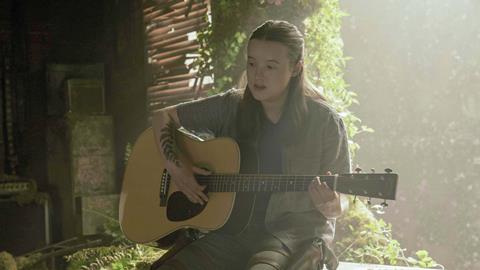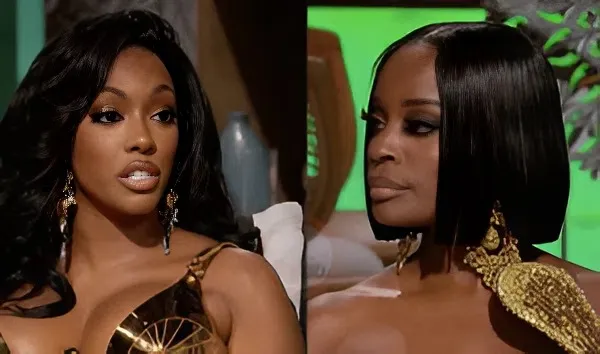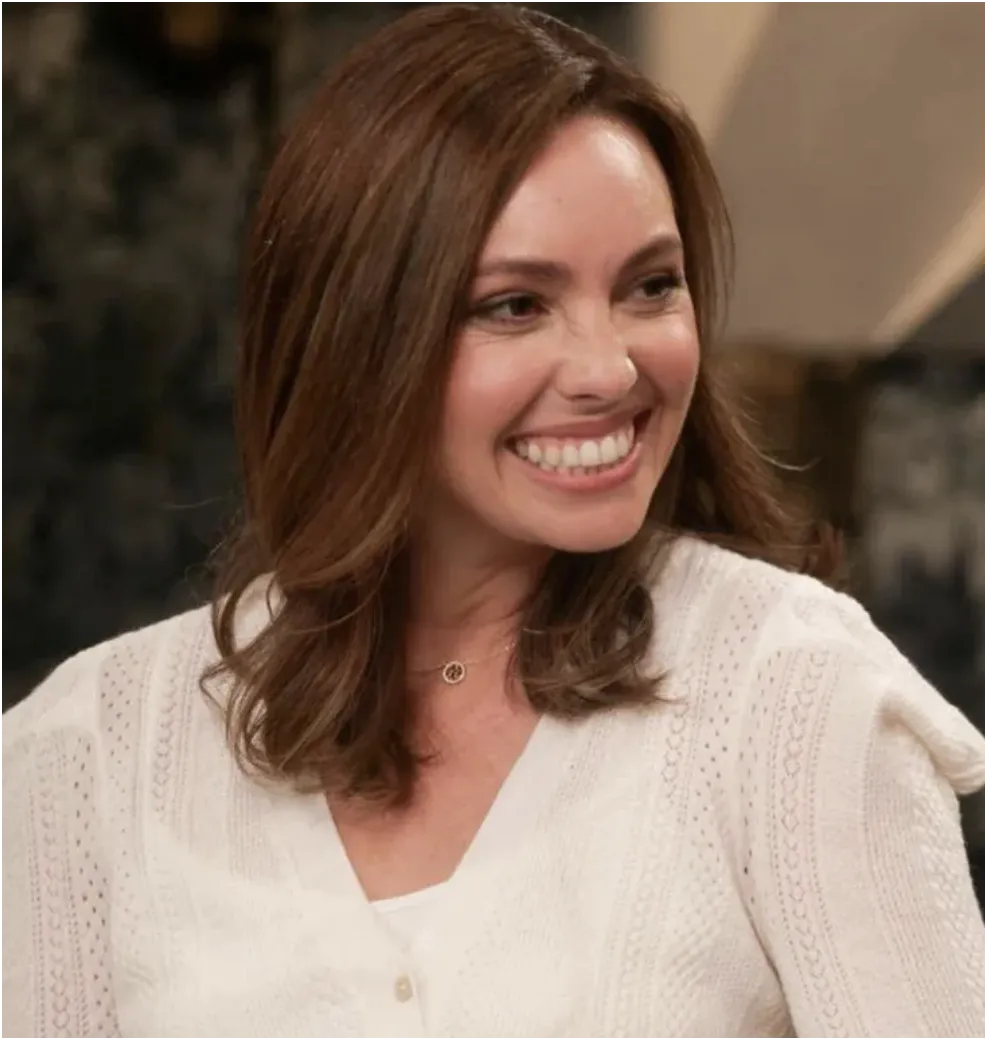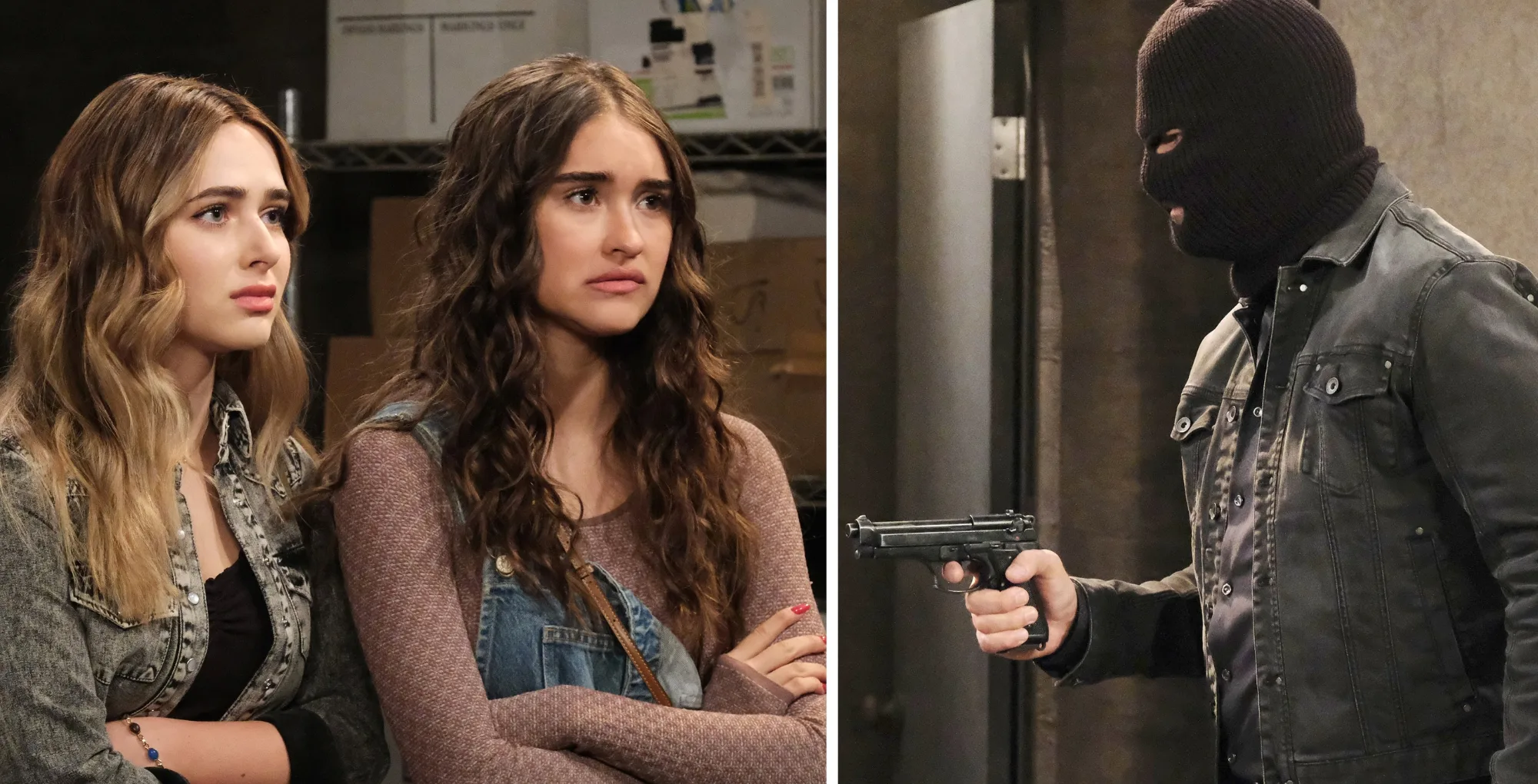
Bella Ramsey channels rage, grief and a 1980s pop classic in the second season of HBO’s The Last Of Us. The UK actor discusses how they got back under the skin of protagonist Ellie. Spoilers ahead!
As a show set in the aftermath of a catastrophic apocalypse, in which a fungal pandemic has turned much of the world’s population into cannibalistic, zombie-like creatures, HBO drama The Last Of Us demands a lot of its actors. There is plenty of action and stunt work to navigate, not to mention the psychological scars of survivors who are clinging on to civilisation – and humanity – by the skin of their teeth.
But an unexpected challenge arose for UK actor Bella Ramsey, returning as central protagonist Ellie for the show’s second season, adapted by Craig Mazin (Chernobyl) from the popular video game by Neil Druckmann. In episode four, Ramsey was faced with a scene in which Ellie serenades new love interest Dina (played by Peruvian American actor Isabela Merced) with a haunting version of A-ha’s hit song ‘Take On Me’.
“It felt more nerve-wracking than doing any of the stunt work, sitting down and playing the guitar in front of the cast and crew,” laughs Ramsey, who identifies as non-binary and gender-fluid. “It felt like a sort of magical moment. But it was very scary, so exposing and vulnerable. There was a balance to that scene – how much does Ellie feel that exposure and vulnerability about playing a beautiful song to the love of her life, and how much she is being Mr Cool Guy about it.”
Walking that emotional tightrope is at the heart of Ramsey’s portrayal of Ellie, who is now a 19-year-old adult, with season two set five years after the events of the first run. While she has seemingly settled into life in the fortified town of Jackson, Wyoming (the show is filmed largely in Vancouver), Ellie is struggling to discover a place where she feels entirely comfortable – both in the community and in her own skin. Ellie develops an even harder edge as she becomes consumed by grief, guilt and revenge when her de facto father Joel (Pedro Pascal) is killed by incoming character Abby (Kaitlyn Dever).
“She is such an amalgamation of fear and terror, of child and this brash, confident, outspoken, monomaniacally focused, traumatised and grieving young person,” says Ramsey. “Her motivation is so clear, she is set on one thing, which is finding and killing Abby, but she struggles to see the bigger picture.”
Different approach
Joel’s death is one of the most shocking moments in a show packed with jolts and makes a serious impact, even though those familiar with the game will have been expecting it. For Ramsey, whose well-documented real-life closeness with Pascal mirrors that between Joel and Ellie, it was a watershed moment.
“I knew it was coming, so it made our moments together very precious, especially in season two,” they recall. “In season one, I did one episode without him [episode seven] and that was so hard because I didn’t realise how much I relied on him energetically until he wasn’t there. I definitely miss him.”
Ramsey found they had to approach the scene in a different way when it came time to film the brutal, pivotal sequence, which takes place in an abandoned hillside home overlooking Jackson.
“I didn’t prepare intentionally, because Ellie doesn’t know what she’s walking into, has no idea what she’s about to see. That moment, where [Ellie is] on the ground and screaming for [Joel], takes so much energy. If I was already in a depressed state coming into it, I would not have had the energy to do it. So, I did the opposite – I got hyped up, listened to crazy songs and got the adrenaline going. In the actual shooting, all that energy released.”
Ramsey ended up filming that difficult scene around six times in total, the sequence broken up into sections and reshot with different angles and close-ups.
“If you watch the rushes of me doing that scene, as soon as they say ‘cut’, I do an insane grin to the camera. I’m not trying to make anyone laugh; instinctively, I have to snap out of it and be like, ‘Hey guys, I’m totally fine!’ so that then I can get back into it again. For some things, it’s important that you stay in [the moment]. But for other things like this, it’s more important you stay in your own headspace.”
Aside from the loss of Joel, the season brings another big change for Ellie, in the form of best friend-turned-girlfriend Dina. Much as it was with Ellie and Joel, the girls’ odd-couple dynamic powers the emotional core of the season: whereas Ellie is insular but impetuous, Dina is bubbly yet practical.
“It’s fascinating seeing a character in a different relationship, and how they shift and develop,” says Ramsey. “It was exciting to explore that side of Ellie. She becomes a protector of Dina, but then Dina is equally as protective of Ellie. It was fun to play, and the scenes are so beautiful and tender.”
The pair’s relationship also contains a lot of gentle humour, particularly as Ellie navigates these newfound feelings as a sometimes awkward teenager. “A show like The Last Of Us has to make you laugh sometimes, otherwise it just becomes too intense,” observes Ramsey. “People are relieved they get to laugh and then, 10 seconds later, we’re traumatising them again.”
For Ramsey, the representation of this central relationship matters in a way that goes beyond the narrative. “I love how integrated queer storylines are in the world of The Last Of Us,” they enthuse. “It never feels like a checkbox exercise; it’s completely within the fabric of the story and the world. Why wouldn’t there be two women or two men falling in love in apocalyptic times?
“This is how it becomes normalised, by being in a show like this,” they continue. “A good portion of viewers may never tune in to a solely queer show, so having queer storylines, queer love and relationships being integrated into a mainstream universe like The Last Of Us is so important.”
Ramsey has been acting since the age of 11 in shows such as Game Of Thrones and movies including Catherine Called Birdy, and has had “a protected journey” through the industry. “I’ve been so well cared for by my team and my family,” they say. “I just adore being on set and always have. It’s where I feel like my best, and where I thrive.”
That remarkable career trajectory means that now, aged just 21, Ramsey is a young non-binary person leading a globally successful show. It is a position they do not take lightly.
“I definitely see it as a responsibility, and it can be overwhelming,” they say. “I deleted my social media for many reasons, but part of it was that I felt so much pressure. Obviously there’s external pressure put on me, but it was more the pressure I was putting on myself to represent an under-represented community.
“It’s not something I really thought about,” they continue. “It’s just who I am. The way that I do represent the non-binary community, the queer community, is just by living and existing in the public eye as myself.”
Ramsey – who ensures their contracts include a ‘green rider’ to promote more on-set sustainability – has also been outspoken about living with neurodiversity after been diagnosed with autism while filming the first season of The Last Of Us.
“I’m still learning how to manage it,” muses Ramsey, who is currently filming comedy Sunny Dancer for writer/director George Jaques, and has written a screenplay, entitled Toast And Jam, inspired by their own experiences with disordered eating.
“I got a diagnosis and was like, ‘Great, now I understand everything. I’m feeling stressed and uncomfortable in my body but it’s fine because now I know why.’ So the next phase I’m entering, now I know all this information, is how can I put things in place to look after myself? That’s something I’m figuring out.”


-1750861860-q80.webp)
